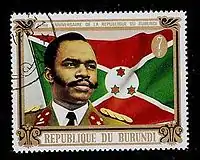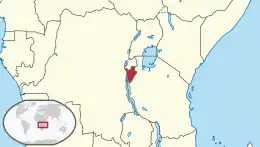Michel Micombero
Michel Micombero (26 August 1940 – 16 July 1983) was a Burundian politician and army officer who ruled the country as its first president and de facto dictator for the decade between 1966 and 1976.
Michel Micombero | |
|---|---|
 Micombero, pictured on a postage stamp in 1967 | |
| 1st President of Burundi | |
| In office 28 November 1966 – 1 November 1976 | |
| Preceded by | Ntare V, as king Himself, as prime minister |
| Succeeded by | Jean-Baptiste Bagaza |
| 8th Prime Minister of Burundi | |
| In office 11 July 1966 – 28 November 1966 | |
| Monarch | Ntare V |
| Preceded by | Léopold Biha |
| Succeeded by | Himself, as President |
| Personal details | |
| Born | 26 August 1940 Rutovu, Ruanda-Urundi (modern-day Burundi) |
| Died | 16 July 1983 (aged 42)[lower-alpha 1] Mogadishu, Somalia |
| Political party | Union for National Progress (UPRONA) |
| Spouse(s) | Adèle Nzeyimana (m. 1965) |
Micombero was an ethnic Tutsi who began his career as an officer in the Burundian army at the time of Burundi's independence in 1962. He studied abroad and was given a ministerial portfolio on his return. He rose to prominence for his role in helping to crush an attempted coup d'état in October 1965 by ethnic Hutu soldiers against the country's monarchy, itself Tutsi. In its aftermath, in 1965 and 1966, Micombero himself instigated two further coups against the monarchy which he perceived as too moderate. The first coup forced the incumbent king into exile, propelling Micombero to the role of prime minister. The second abolished the monarchy itself, bringing Micombero to power as the first president of the new Republic of Burundi.
Micombero ruled Burundi as a military dictator from 1966. He led a one-party state which centralised the country's institutions and adopted a neutral stance in the Cold War. Dissent was repressed and, in 1972, an attempt to challenge Micombero's power led to genocidal violence against the Hutu population in which around 100,000 people, mainly Hutus, were killed. His regime finally collapsed in 1976 when he was ousted in a coup d'état by another army officer, Jean-Baptiste Bagaza, who installed himself as president. Micombero went into exile in Somalia where he died in 1983.
Biography
Origins and early political career

Micombero was born in Rutovu, Bururi Province in Belgian-ruled Ruanda-Urundi on 26 August 1940. His parents were peasants of Hima ethnicity, part of the wider Tutsi ethnic group.[2] Micombero studied at Catholic mission schools in Burundi and, in 1960, joined the Burundian military which was being formed ahead of planned independence in 1962.[2] As part of his training, he was sent to study at the Royal Military Academy in Brussels, Belgium to train as an officer.[2] At the time of the independence of the Kingdom of Burundi in July 1962, he held the rank of captain.[2]
In early post-independence Burundi, the Tutsi-dominated monarchy of Mwambutsa IV attempted to balance the interests of Tutsi with those of the Hutu majority. In 1963, Micombero joined the ruling Union for National Progress (Union pour le Progrès national, UPRONA) party which, though dominated by Tutsi, also tried to attract Hutu members.[2] In June, Micombero was named State Secretary for Defense, making him head of the military at the age of 23.[2] In October 1965, a group of ethnic Hutus in the army and police attempted to overthrow the Burundian monarchy. Their attempt, though unsuccessful, led to Mwambutsa IV fleeing into exile. Micombero led the repression against the coup's perpetrators.[2] In July 1966, a second coup d'état brought the king's son, Ntare V, to power and suspended the national constitution. However, when Ntare was on a state visit to the neighbouring Republic of the Congo in November 1966, a third coup d'état abolished the monarchy and a republic was proclaimed on 28 November.[2] As a colonel, Micombero took power as the country's first President on 28 November 1966.[2]
Dictatorship

As President of Burundi, Micombero ruled through UPRONA as a one-party state. His ideology of "democratic centralism" brought all the country's institutions and media under the regime's control.[2] His regime combined ideas from the socialist ideology of Tanzania with other doctrines from Joseph-Désiré Mobutu's regime in the Democratic Republic of the Congo (known as Zaire after 1971).[2] As a Cold War leader, he was able to play off both Communist and Western powers against one another.[2] Micombero became increasingly paranoid after suffering an injury in a road accident in 1967.[2] He was widely believed to be an alcoholic. Various plots against the regime were discovered and unrest remained.[2] His base of support became increasingly restricted to Tutsi in the northern and central regions of Burundi.[2]
In April 1972, a rebellion broke out among the Hutu at Rumonge in the south at the encouragement of the Tanzanian regime and spread rapidly.[2] In subsequent ethnic violence, as many as 1,000 Tutsi were killed. The response of the Micombero regime was to launch a campaign of genocidal violence against the Hutu in the region in which 100,000 people are thought to have been killed. The deposed king Ntare, said to have led the rebellion, was himself murdered.[2] In 1973, after further violence, Mobutu was forced to intervene to prevent Tanzanian invasion.[2] Following the end of the crisis, Micombero introduced a new constitution allowing him to run for a further seven-year term. He also laid the foundation for the Economic Community of the Great Lakes Countries the same year, along with the governments of Rwanda and Zaire.[2]
In November 1976 opponents, led by Colonel Jean-Baptiste Bagaza, led a successful coup d'état against Micombero's regime. Micombero himself was arrested and a second republic was declared under the dictatorship of Bagaza which would last until 1987.[2] Although a Tutsi and a participant in the killings of 1972, Bagaza made concessions to the Hutu majority and made some progress towards modernising the Burundian state until he too was deposed in 1987.
Exile and death
Micombero was exiled from Burundi in 1977.[2] He took up residence in Somalia, then ruled by dictator Siad Barre who was a close friend. He gained a degree in economics from the University of Somalia in 1982.[1] He died of a heart attack in 1983.[1]
References
- According to the obituary published in The New York Times two days later, Micombero died on 16 July 1983.[1] His entry in the Dictionary of African Biography gives 6 August 1983 instead.[2]
Footnotes
Bibliography
- "Michel Micombero, 43, Dies: Former President of Burundi". The New York Times. UPI. 18 July 1983. Retrieved 4 April 2016.
- Chrétien, Jean-Pierre (2008). "Micombero, Michel". In Gates, Louis, Jr.; Akyeampong, Emmanuel K. (eds.). Dictionary of African Biography. Oxford: Oxford University Press.
| Political offices | ||
|---|---|---|
| Preceded by Léopold Biha |
Prime Minister of Burundi 1966 |
Succeeded by Position abolished |
| Preceded by Ntare V Ndizeye (As king) |
President of Burundi 1966–1976 |
Succeeded by Jean-Baptiste Bagaza |